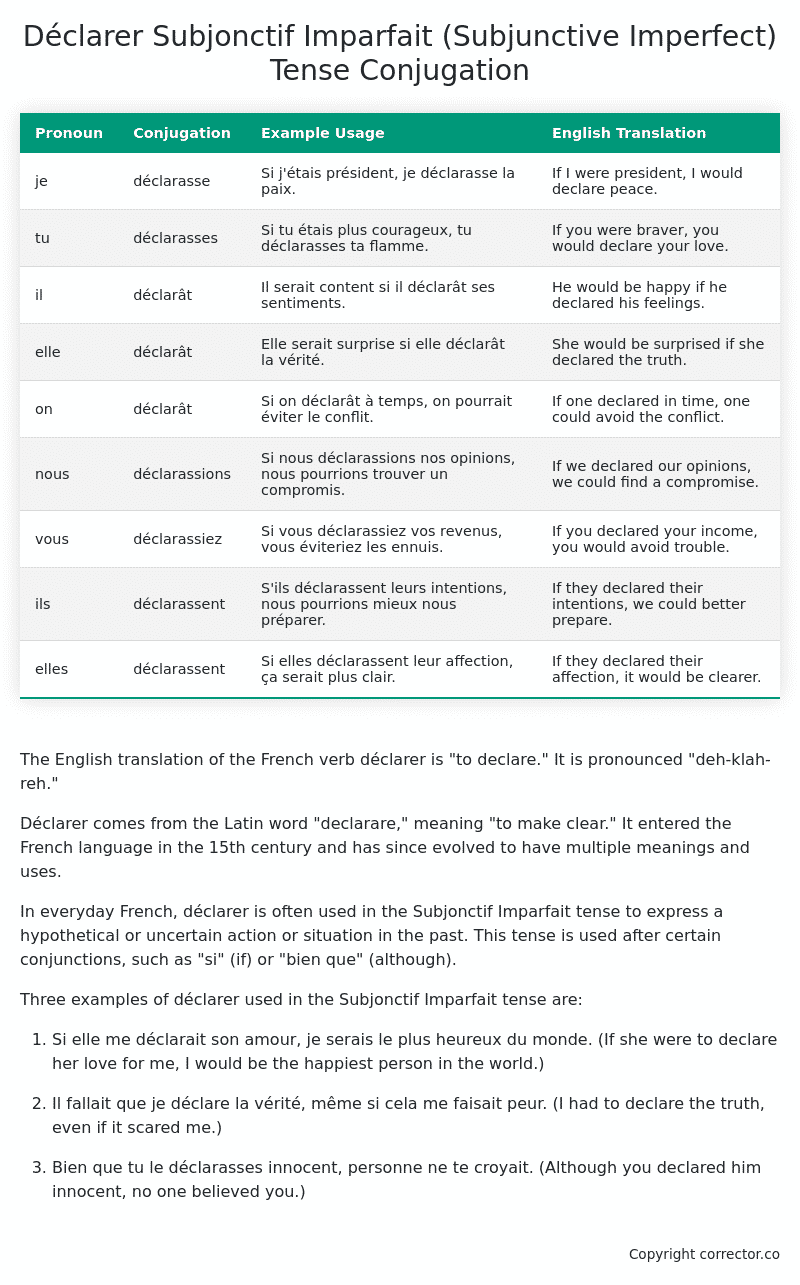Subjonctif Imparfait (Subjunctive Imperfect) Tense Conjugation of the French Verb déclarer
Introduction to the verb déclarer
The English translation of the French verb déclarer is “to declare.” It is pronounced “deh-klah-reh.”
Déclarer comes from the Latin word “declarare,” meaning “to make clear.” It entered the French language in the 15th century and has since evolved to have multiple meanings and uses.
In everyday French, déclarer is often used in the Subjonctif Imparfait tense to express a hypothetical or uncertain action or situation in the past. This tense is used after certain conjunctions, such as “si” (if) or “bien que” (although).
Three examples of déclarer used in the Subjonctif Imparfait tense are:
-
Si elle me déclarait son amour, je serais le plus heureux du monde. (If she were to declare her love for me, I would be the happiest person in the world.)
-
Il fallait que je déclare la vérité, même si cela me faisait peur. (I had to declare the truth, even if it scared me.)
-
Bien que tu le déclarasses innocent, personne ne te croyait. (Although you declared him innocent, no one believed you.)
Table of the Subjonctif Imparfait (Subjunctive Imperfect) Tense Conjugation of déclarer
| Pronoun | Conjugation | Example Usage | English Translation |
|---|---|---|---|
| je | déclarasse | Si j’étais président, je déclarasse la paix. | If I were president, I would declare peace. |
| tu | déclarasses | Si tu étais plus courageux, tu déclarasses ta flamme. | If you were braver, you would declare your love. |
| il | déclarât | Il serait content si il déclarât ses sentiments. | He would be happy if he declared his feelings. |
| elle | déclarât | Elle serait surprise si elle déclarât la vérité. | She would be surprised if she declared the truth. |
| on | déclarât | Si on déclarât à temps, on pourrait éviter le conflit. | If one declared in time, one could avoid the conflict. |
| nous | déclarassions | Si nous déclarassions nos opinions, nous pourrions trouver un compromis. | If we declared our opinions, we could find a compromise. |
| vous | déclarassiez | Si vous déclarassiez vos revenus, vous éviteriez les ennuis. | If you declared your income, you would avoid trouble. |
| ils | déclarassent | S’ils déclarassent leurs intentions, nous pourrions mieux nous préparer. | If they declared their intentions, we could better prepare. |
| elles | déclarassent | Si elles déclarassent leur affection, ça serait plus clair. | If they declared their affection, it would be clearer. |
Other Conjugations for Déclarer.
Le Present (Present Tense) Conjugation of the French Verb déclarer
Imparfait (Imperfect) Tense Conjugation of the French Verb déclarer
Passé Simple (Simple Past) Tense Conjugation of the French Verb déclarer
Passé Composé (Present Perfect) Tense Conjugation of the French Verb déclarer
Futur Simple (Simple Future) Tense Conjugation of the French Verb déclarer
Futur Proche (Near Future) Tense Conjugation of the French Verb déclarer
Plus-que-parfait (Pluperfect) Tense Conjugation of the French Verb déclarer
Passé Antérieur (Past Anterior) Tense Conjugation of the French Verb déclarer
Futur Antérieur (Future Anterior) Tense Conjugation of the French Verb déclarer
Subjonctif Présent (Subjunctive Present) Tense Conjugation of the French Verb déclarer
Subjonctif Passé (Subjunctive Past) Tense Conjugation of the French Verb déclarer
Subjonctif Imparfait (Subjunctive Imperfect) Tense Conjugation of the French Verb déclarer (this article)
Subjonctif Plus-que-parfait (Subjunctive Pluperfect) Tense Conjugation of the French Verb déclarer
Conditionnel Présent (Conditional Present) Tense Conjugation of the French Verb déclarer
Conditionnel Passé (Conditional Past) Tense Conjugation of the French Verb déclarer
L’impératif Présent (Imperative Present) Tense Conjugation of the French Verb déclarer
L’infinitif Présent (Infinitive Present) Tense Conjugation of the French Verb déclarer
Struggling with French verbs or the language in general? Why not use our free French Grammar Checker – no registration required!
Get a FREE Download Study Sheet of this Conjugation 🔥
Simply right click the image below, click “save image” and get your free reference for the déclarer Subjonctif Imparfait tense conjugation!

Déclarer – About the French Subjonctif Imparfait (Subjunctive Imperfect) Tense
Formation
Common Everyday Usage Patterns
Interactions with Other Tenses
Subjonctif Présent
Indicatif Passé Composé
Conditional
Conditional Perfect
Summary
I hope you enjoyed this article on the verb déclarer. Still in a learning mood? Check out another TOTALLY random French verb conjugation!


